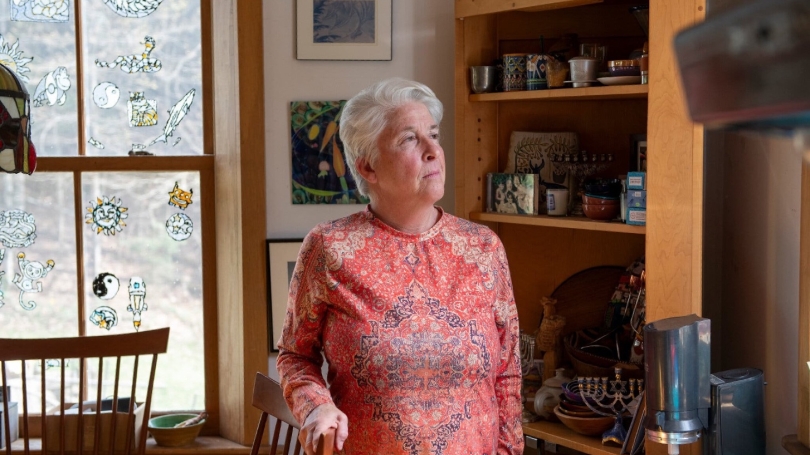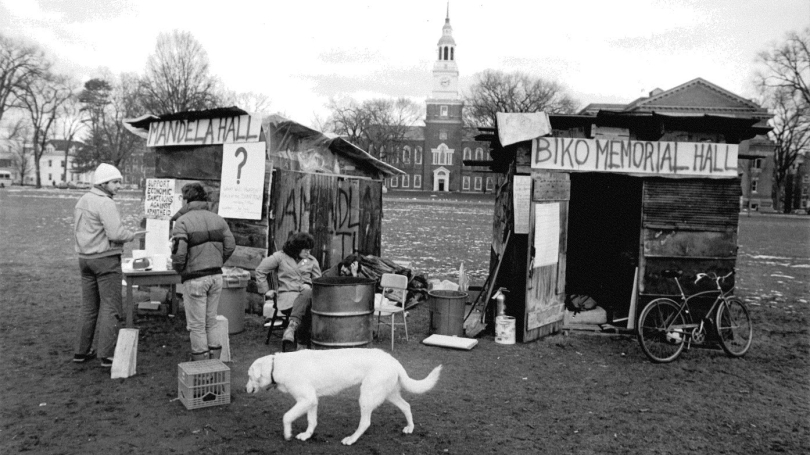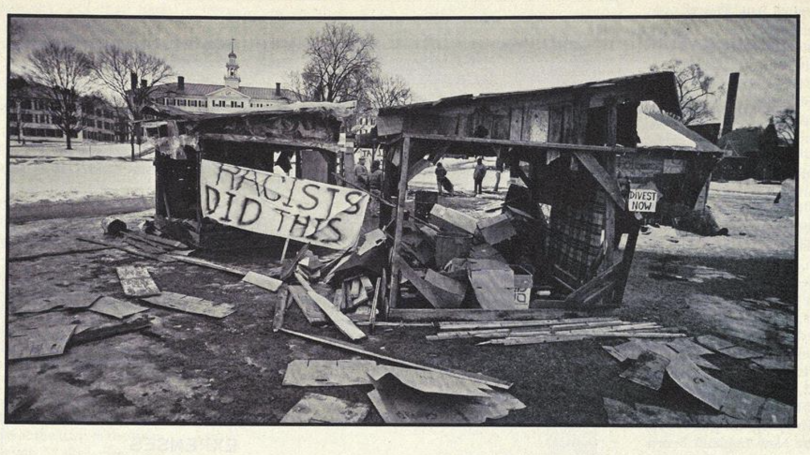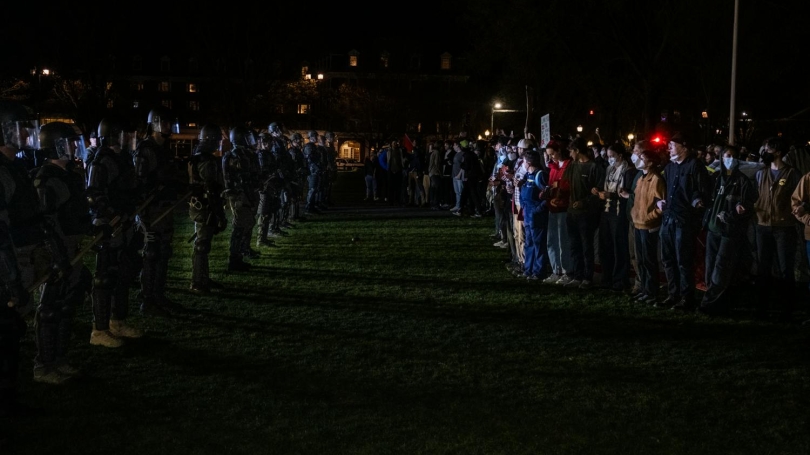Published in The Dartmouth May 23, 2024
To the Board of Trustees:
We write to you as alumni who, thanks to the training and mentorship we received from Dartmouth's history department, have all pursued doctorate degrees in the humanities. Now, as teachers and researchers at universities across the country, we cannot help but use the very skills we learned at Dartmouth — particularly from history professor Annelise Orleck — to consider the recent events on campus.
In November 1985, Dartmouth students erected a shantytown on the Green to bring attention to the living conditions of Black South Africans under apartheid. The shantytown complemented other efforts — including an occupation of Parkhurst Hall — to get the College to divest from companies with ties to racially segregated South Africa. Students lived in the shanties until January 1986, when 12 students armed with sledgehammers destroyed three of the four structures before campus police intervened. The students sleeping inside the structures at the time were unharmed. The students who attacked were affiliated with The Dartmouth Review and called themselves "The Dartmouth Committee to Beautify the Green Before Winter Carnival." With Winter Carnival a month away, many viewed the timing of the attack — which occurred the day after Martin Luther King, Jr. Day — as racist. On Feb. 12, after three weeks of deliberations, a committee of students, faculty and administrators decided to suspend the students involved in the attack. In a separate decision handed down the same day, the College decided to dismantle the last remaining shanty, which it previously had protected as an expression of free speech. Eighteen student protesters, who blocked the arrival of the flatbed truck that was supposed to haul away the structure, were arrested for criminal trespass.
We share the above history to encourage the College to reflect on its past and present response to student and faculty protesters. The parallels between the February 1986 and May 2024 arrests on the Green are striking. In both instances, students inspired to action by knowledge of injustice in other parts of the world — apartheid in South Africa and mass civilian casualties in Gaza — used the Green as a site of peaceful protest where they were subsequently met with violence. A crucial difference between the two protests is the agent of the violence. In 1986, College security guards stepped in to protect students from the shantytown aggressors' violent attacks. In 2024, the College's Safety and Security officers, the Hanover Police and New Hampshire State Troopers were authorized by the College to dismantle the protests and used force against peaceful protesters to do so. Dartmouth, like any institution of higher education, is entitled to have rules for how its spaces are used and by whom, and it is entitled to enforce those rules. However, the scale of force and speed of escalation used — with the Beilock administration's consent — to disband student protesters is what alarms us as alumni and as educators. It was surreal to see riot police on the Green armed with truncheons and supported by armored cars and klieg lights.
The Green has been the canvas upon which generations of Dartmouth students have staged protests against the Vietnam War, violence against women, apartheid in South Africa and in support of civil rights and climate justice — among other issues. Even if they did not agree with their message or methods, many Dartmouth administrators have not resorted to violence to deal with student protesters. Beilock broke with tradition and set a dangerous precedent when she allowed violent arrests to take place on the Green. Another lesson drawn from such comparative historical analysis is that the disproportionate use of violence against peaceful protests rarely has the intended effect of squashing movements for justice. We find it hard to believe there were no other means of enforcing College policy. To militarize the Green is to lose the heart of the College, figuratively and literally.
As scholars, alumni of Dartmouth and professionals who spend our days in college classrooms, we ask Beilock to do the following:
1. Pledge to never again call in the police on peaceful protesters. After the 1986 shantytown incident, the College reviewed its policies regarding student protests. In the wake of the May 1 violent crackdown on student protests on campus, the College must again reckon with its actions and commit to non-violence — including an agreement not to call in the police — in its engagement with peaceful protesters. We never again want to see militarized police vehicles parked in front of Baker-Berry Library. We never again want to see faculty members pushed to the ground by riot police. We never again want to see terror on the faces of students as they are forced into custody for peacefully protesting against injustice.
2. Drop all charges, issue an apology to the students and professors who were arrested and reaffirm the Green as a space where all are welcome by reinstating all-campus access to those arrested on May 1. We acknowledge these are fraught times on college campuses, and we do not envy the job of the College President. We also recognize that Beilock saw her actions in calling in the police as supporting Jewish students on campus, many of whom are alarmed by rising rates of antisemitism in the United States. Yet, her actions traumatized the peaceful protesters, including Jewish students, who were critical of the wanton violence of the Netanyahu government in Gaza. Beilock's actions did, however, alienate Muslim, Arab and Palestinian students on campus. Beilock shared in her letter published in The Dartmouth that she does not believe it is an appropriate use of institutional power to request that all charges be dropped. We find this position inconsistent with her decision to call in police and to offer Dartmouth College property in the form of DOC vans to facilitate the transportation of peaceful protesters to jail. Requesting that the prosecutor drop charges would help to correct the injustices of May 1 and the role that Beilock and the College played in them.
3. Issue a public apology to Orleck, whose tireless commitment to supporting student research has inspired our own pedagogical styles in university classrooms around the country. Her research on the history of labor organizing in the United States, especially the role of Black and immigrant women in that movement, has also influenced our own research trajectories. Orleck's contributions have revealed the importance of recovering the efforts of activists often left out of the historical narrative. By standing as a buffer between the student protesters and the riot police, Orleck manifested her deep and inspiring commitment to student learning in and outside the classroom.
As Trustees, you are charged with ensuring that Dartmouth lives up to its highest ideals. We ask that you use your authority to ensure that the harms committed earlier this month are redressed and prevented from ever happening again. Let this most recent incident be an isolated one, rather than the start of a new era where peaceful protest is not tolerated and student safety is uncertain.
The undersigned alumni are former students of history professor Annelise Orleck and have subsequently pursued advanced degrees in history or adjacent fields.
Claire Dunning '08, Ph.D
Eagle Glassheim '92, Ph.D
David Glovsky '08, Ph.D
Taja-Nia Y. Henderson '97, JD/Ph.D
Aimee Loiselle '92, Ph.D
Justine Modica '09, Ph.D
Allison Puglisi '15, Ph.D
Matt Richardson '91, MFA, Ph.D
Nova Robinson '08, Ph.D
Karen M. Tani '02, JD/Ph.D
Original post: Claire Dunning '08, Nova Robinson '08 and Justine Modica '09. "Dunning, Modica and Robinson: An Open Letter to the Board of Trustees from Former Students of Professor Annelise Orleck." May 23, 2024. The Dartmouth. https://www.thedartmouth.com/article/2024/05/dunning-modica-and-robinson-an-open-letter-to-the-board-of-trustees-from-former-students-of-professor-annelise-orleck#.



